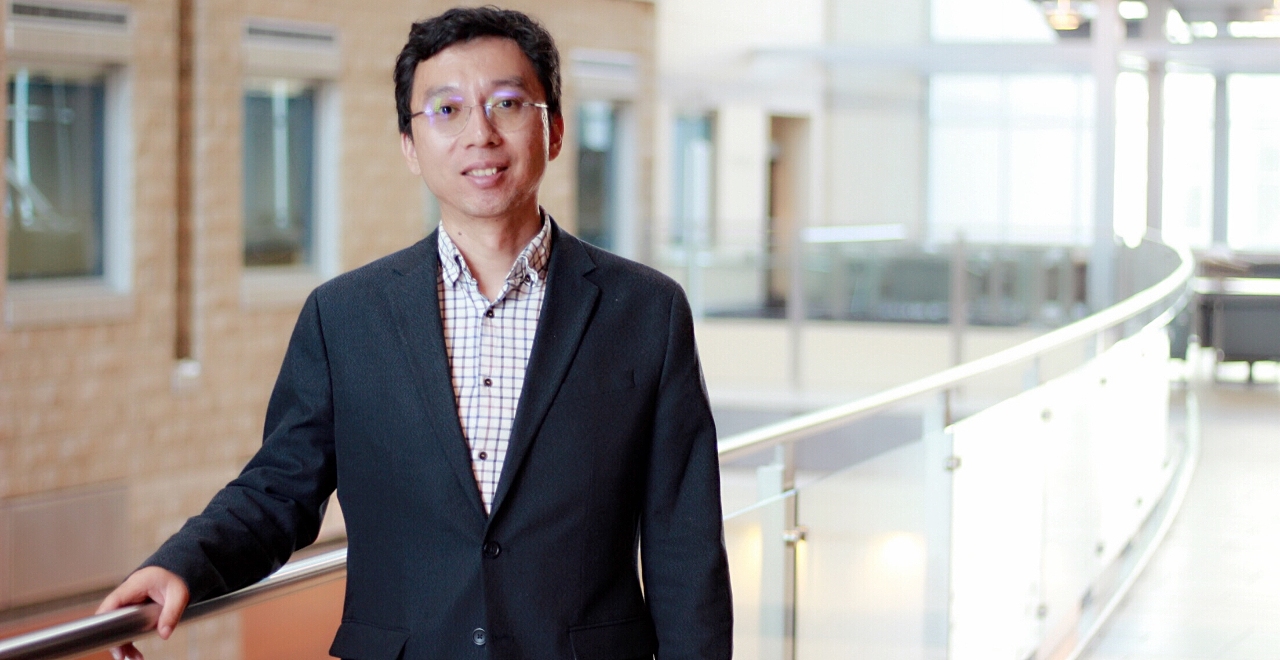Improving the diagnosis of mental disorders and enabling experts to better personalize treatment is at the heart of a federal investment in machine learning and precision health at the University of Alberta.
Psychiatry professor Bo Cao, along with Russell Greiner and Serdar Dursun, received $258,000 from the Canada Foundation for Innovation (CFI) John R. Evans Leaders Fund to build infrastructure in the Computational Psychiatry Group, which will develop machine learning models from large populations for a host of different datasets for mental illnesses, such as depression, bipolar disorder and schizophrenia.
Cao, who also holds the Canada Research Chair in Computational Psychiatry, explained there are two major roles in computational psychiatry-to detect a disease early, helping prevention and timely intervention, and to predict the progression and treatment outcomes for the disease, both of which emphasize individualized predictions using multiple types of data.
For example, he explained one day a machine learning model will be built that will see a brain scan of a patient compared against a database of brain scans, so the model can assist in making decisions about the diagnosis and treatments.
"Basically we would like to apply big data and machine learning approaches to psychiatry, and eventually personalize the diagnosis and treatment for mental health," said Cao. "That's actually the ultimate goal-we're not there yet, but we are on a promising path."
He added his team's overarching aim is to make these machine learning tools accurate and reliable, improving current clinical judgment in diagnosis and treatment selection.
"It's not aiming for replacing doctors but assisting them-it's still the doctors and patients making the decisions."
Cao said the Computational Psychiatry Group is a long-term collaboration between the Department of Psychiatry in the Faculty of Medicine & Dentistry and the Department of Computing Science in the Faculty of Science, which builds on more than four decades of expertise in AI and machine learning. The group has active collaborations with Amii, IBM Centers for Advanced Studies, AltaML, Alberta Health and AHS, and is a core part of two of the university's signature areas: Precision Health and AI4Society.
"The equipment is not just for the lab but for the Computational Psychiatry Group. We hope to help extend the effort jointly with more researchers who are interested in this new field within and beyond the U of A, so that we can achieve personalized mental health for the public good," said Cao.
All told, 16 U of A research projects will receive CFI grants totalling $3.4 million, as well as matching funds from the Government of Alberta.
U of A funded projects
Forecasting community reassembly in changing seascapes: Cross-scale science to uncover patterns, processes, consequences
Stephanie Green, Faculty of Science
$148,000
Projected media in live performances
Guido Tondino, Robert Shannon and Lee Livingstone, Faculty of Arts
$98,000
Additive manufacturing using a direct energy laser system for the resource sector
Hani Henein, Ahmed Qureshi and Jason Myatt, Faculty of Engineering
$195,000
Field lab for the investigation of altitude related population adaptation and health
Craig Steinback, Faculty of Kinesiology, Sport, and Recreation
$236,000
The human explanted heart program: A translational bridge for cardiovascular medicine and drug development
John Seubert and Gavin Oudit, Faculty of Medicine & Dentistry
$217,000
The RAS-MAPK-capicua axis, a converging molecular highway in neurological disorders and leukemia
Qiumin Tan, Faculty of Medicine & Dentistry
$159,000
Terawatt laser facility for advanced applications
Robert Fedosejevs, Faculty of Engineering
$516,000
An all-optical platform for the investigation of animal models of neuropsychiatric and neurodegenerative disease
Allen Chan, Faculty of Medicine & Dentistry
$217,000
Defining the role of proteases in health and diseases using innovative systems biology approaches
Olivier Julien and Joanne Lemieux, Faculty of Medicine & Dentistry
$130,000
High speed confocal microscopic system for interfacial science
Xuehua Zhang, Faculty of Engineering
$234,000
Infrastructure for emerging priority in AI and computational psychiatry
Bo Cao, Faculty of Medicine & Dentistry; Russell Greiner, Faculty of Science; and Serdar Dursun, Faculty of Medicine & Dentistry
$258,000
Avian behaviour, ecology and energetics
Kimberley Mathot, Faculty of Science
$170,000
Laboratory for Sound Art, Sound Health, and Sound Communities (Sound3 Lab)
Scott Smallwood, Faculty of Arts
$211,000
Development and magnetometric application of powerful ultraviolet frequency comb lasers
Gil Porat, Faculty of Engineering
$111,000
Chemistry at the interfaces: Devices for capturing and storing renewable energy
Lingzi Sang, Faculty of Science
$227,000
Advanced structural response characterization system for civil infrastructure
Douglas Tomlinson, Faculty of Engineering
$269,000
